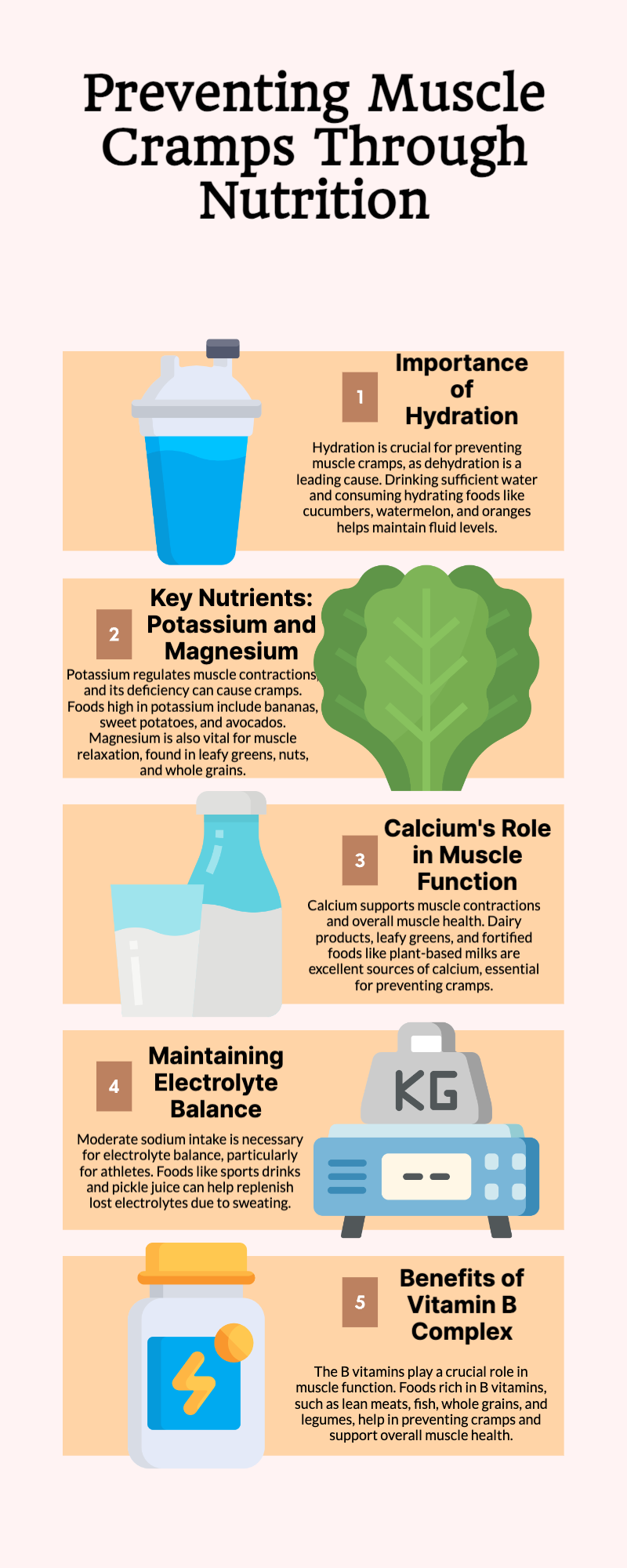Get our exclusive report. Download the iSport360 Club Switching Report Here – For Club Admins, Rec Leaders and Coaches.
Preventing Muscle Cramps: The Essential Foods to Eat
Muscle cramps can be an uncomfortable and painful experience, often striking at the most inconvenient times. Whether you’re an athlete pushing your limits, a fitness enthusiast, or someone prone to cramps during everyday activities, understanding how to prevent these spasms is crucial. One of the most effective ways to ward off muscle cramps is through proper nutrition. By incorporating specific foods into your diet, you can ensure that your body has the necessary nutrients to keep muscle cramps at bay.
Hydration: The First Line of Defense
Before diving into specific foods, it’s important to acknowledge the role of hydration in preventing cramps. Dehydration is a leading cause of muscle cramps, so drinking enough water throughout the day is essential. In addition to plain water, incorporating hydrating foods like cucumbers, watermelon, and oranges can help maintain your fluid balance.
Potassium-Rich Foods
Potassium is a key mineral that helps regulate muscle contractions and fluid balance in the body. A deficiency in potassium can lead to muscle cramps, so it’s important to consume potassium-rich foods regularly. Some excellent sources of potassium include:
- Bananas: Often touted as the go-to food for preventing cramps, bananas are packed with potassium and are easy to incorporate into your diet.
- Sweet Potatoes: These nutrient-dense tubers are not only high in potassium but also provide complex carbohydrates for sustained energy.
- Avocados: With a rich potassium content, avocados also offer healthy fats that support overall health.
Magnesium Matters
Magnesium plays a crucial role in muscle function and relaxation. A lack of magnesium can lead to muscle cramps, making it important to include magnesium-rich foods in your diet. Some top sources of magnesium are:
- Leafy Greens: Spinach, kale, and Swiss chard are excellent sources of magnesium, and they can be easily added to salads, smoothies, and main dishes.
- Nuts and Seeds: Almonds, pumpkin seeds, and sunflower seeds are rich in magnesium and make for convenient, healthy snacks.
- Whole Grains: Foods like brown rice, quinoa, and whole wheat bread provide magnesium along with other essential nutrients.
Calcium for Muscle Health
Calcium is well-known for its role in bone health, but it also plays a critical part in muscle function. Adequate calcium levels help ensure proper muscle contractions and prevent cramps. Foods high in calcium include:
- Dairy Products: Milk, yogurt, and cheese are excellent sources of calcium. Opt for low-fat or fat-free versions to maintain a balanced diet.
- Leafy Greens: In addition to magnesium, leafy greens like collard greens and bok choy are also rich in calcium.
- Fortified Foods: Many plant-based milk alternatives and cereals are fortified with calcium, making them great options for those who avoid dairy.
Sodium and Electrolyte Balance
While too much sodium can be detrimental to health, a moderate amount is necessary to maintain electrolyte balance and prevent cramps, especially for athletes who lose sodium through sweat. Foods to help maintain this balance include:
- Sports Drinks: These can replenish electrolytes lost during intense exercise. Opt for low-sugar versions when possible.
- Pickle Juice: Surprisingly, pickle juice is often used by athletes to quickly relieve cramps due to its high sodium content.
Vitamin B Complex
The B vitamins, particularly B1 (thiamine), B6 (pyridoxine), and B12, are essential for muscle function and can help prevent cramps. Foods rich in B vitamins include:
- Meat and Fish: Lean meats, poultry, and fish like salmon and trout are excellent sources of B vitamins.
- Whole Grains: Fortified cereals, brown rice, and oatmeal can provide a good amount of B vitamins.
- Legumes: Beans, lentils, and chickpeas are rich in B vitamins and also offer protein and fiber.
Preventing muscle cramps involves a combination of proper hydration and a diet rich in essential nutrients. By incorporating potassium, magnesium, calcium, sodium, and B vitamins into your daily meals, you can help your body maintain optimal muscle function and reduce the likelihood of cramps. Remember, a balanced diet not only supports muscle health but also contributes to overall well-being. So, stock up on these cramp-preventing foods and enjoy a healthier, more comfortable lifestyle.
iSport360 is the only app that does it all for youth sports. For more information on what we do, click here.
About the author:
Amy Masters is a sports mom, coach, and club administrator. She has been coaching youth sports for more than 10 years. She started Jr Lions Field Hockey, the youth recreation program for the Hunterdon County community growing it from 40 players in year 1 to 150 players by year 3. A few years later, she saw the love and competitiveness grow then started Omega Field Hockey Club serving NJ and PA players. Before coaching, she was a collegiate field hockey player for Lock Haven University. In her spare time (lol), she is head of marketing for iSport360 and the co-editor of the Youth Sports Survival Guide. The Youth Sports Survival Guide is the largest youth sports newsletter in the world.
Learn more or request a demo of our youth sports software that is helping teams improve communication, organization and player development.
September 15, 2024






